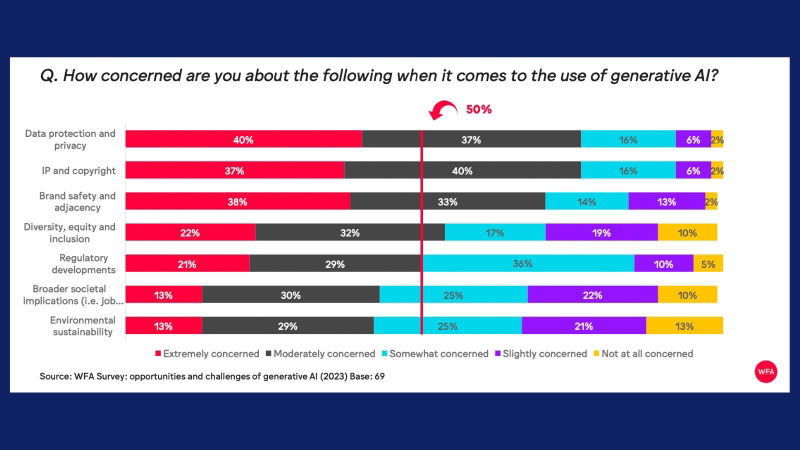
Why 45% of brands use AI in their marketing strategies
share on
As the use of AI in campaigns becomes increasingly prevalent, it comes as no surprise that 45% of brands are already using it in their marketing strategies while 33% have expressed intent to do so in the future. Brands utilising generative AI use it for content creation, personalisation, customer experience, and content ideation.
Approximately 89% of these brands have also cited improved productivity and efficiency from generative AI, while 76% cited reduced costs, and 46% said creativity improved.
These were the results of recent research done by the World Federation of Advertising which also revealed cautious optimism regarding the potential of AI in driving business growth with respondents averaging seven out of ten when asked to grade their levels of enthusiasm. The findings are based on feedback collated in September this year from 69 senior respondents across 55 member companies.
Don't miss: 73% of consumers trust content by generative AI: Here's why they shouldn't
However, the same report also revealed that marketers remain wary about the potential risks of generative AI to brand reputation. In fact, 77% were worried about data protection, intellectual property and copyright risks when using generative AI while 71% of respondents said they were extremely concerned when it came to brand safety, adjacency and diversity.
Additionally, 52% of respondents also agreed that existing regulations around data protection, copyright and non-discrimination are insufficient to address the risks of using generative AI in marketing.

Other concerns marketers had toward generative AI include regulatory developments, and broader societal issues such as job displacement and its impact on the creative industries to name a few. Marketers have also identified a lack of transparency across supply chains with 50% saying they were somewhat or not fully aware of how their supply chain uses generative AI on their behalf.
Moving forward, to mitigate these concerns, 81% of marketers have said that they have developed or are in the process of developing internal policies on the use of generative AI. To complement the policy review, 71% of marketers plan to upskill their employees on effective AI use as part of a responsible marketing strategy.
“We need to review the opportunities and challenges through the prism of all business functions, so we can put in place the measures necessary to give marketers the confidence they need to make the most of the exciting possibilities that AI can offer to deliver business growth,” said Stephan Loerke, CEO of WFA.
When it comes to developing a company’s AI strategy, 40% of respondents shared that they have a purpose-built cross-functional team to lead their approach. On the other hand, one in five respondents have a chief digital officer to do so and nearly one in four have opted for a decentralised approach without a single AI lead. Interestingly, 5% of respondents have reported having a chief AI officer.
WFA’s reports also highlighted that marketing teams were the most involved in the overall AI strategy in seven out of 10 cases or 73% with legal following closely behind at 71%. Half of respondents claim to be working with third parties such as agencies, consultancies or tech partners.
These results will be used as a starting point for how the various WFA peer-to-peer forums seek to develop plans to address the challenges raised by AI in their respective fields by the WFA Executive Committee, according to a statement by the organisation.
The biggest conference is back! Experience the future of marketing with 500+ brilliant minds at Digital Marketing Asia on 28 - 30 November in Singapore. Uncover groundbreaking strategies that connect leading brands with their target audiences effectively.
Related articles:
Study: APAC marketers (finally) start embracing the death of third-party cookies
'AI the key to increased employee productivity', says study
Coca-Cola takes a look into the future with new AI-powered drink
share on
Free newsletter
Get the daily lowdown on Asia's top marketing stories.
We break down the big and messy topics of the day so you're updated on the most important developments in Asia's marketing development – for free.
subscribe now open in new window
